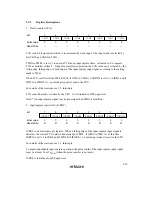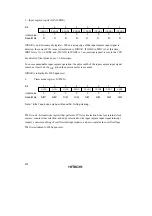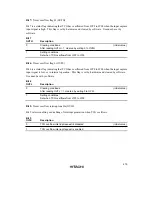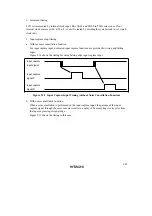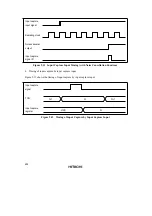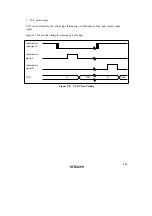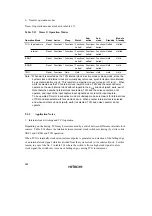
227
Table 9.15
Input Capture Input Signal Input Edges Due to Input Capture Input Pin
Switching, and Conditions for Their Occurrence
Input Capture Input Signal
Input Edge
Conditions
Generation of rising edge
When TMIG is modified from 0 to 1 while the TMIG pin is high
When NCS is modified from 0 to 1 while the TMIG pin is high,
then TMIG is modified from 0 to 1 before the signal is sampled
five times by the noise canceler
Generation of falling edge
When TMIG is modified from 1 to 0 while the TMIG pin is high
When NCS is modified from 0 to 1 while the TMIG pin is low,
then TMIG is modified from 0 to 1 before the signal is sampled
five times by the noise canceler
When NCS is modified from 0 to 1 while the TMIG pin is high,
then TMIG is modified from 1 to 0 after the signal is sampled five
times by the noise canceler
Note:
When the P1
3
pin is not set as an input capture input pin, the timer G input capture input
signal is low.
• Switching input capture input noise canceler function
When performing noise canceler function switching by modifying NCS in port mode register 3
(PMR3), which controls the input capture input noise canceler, TMIG should first be cleared to 0.
Note that if NCS is modified without first clearing TMIG, an edge will be regarded as having been
input at the pin even though no valid edge has actually been input. Input capture input signal input
edges, and the conditions for their occurrence, are summarized in table 9.16.
Table 9.16
Input Capture Input Signal Input Edges Due to Noise Canceler Function
Switching, and Conditions for Their Occurrence
Input Capture Input Signal
Input Edge
Conditions
Generation of rising edge
When the TMIG pin level is switched from low to high while
TMIG is set to 1, then NCS is modified from 0 to 1 before the
signal is sampled five times by the noise canceler
Generation of falling edge
When the TMIG pin level is switched from high to low while
TMIG is set to 1, then NCS is modified from 1 to 0 before the
signal is sampled five times by the noise canceler

